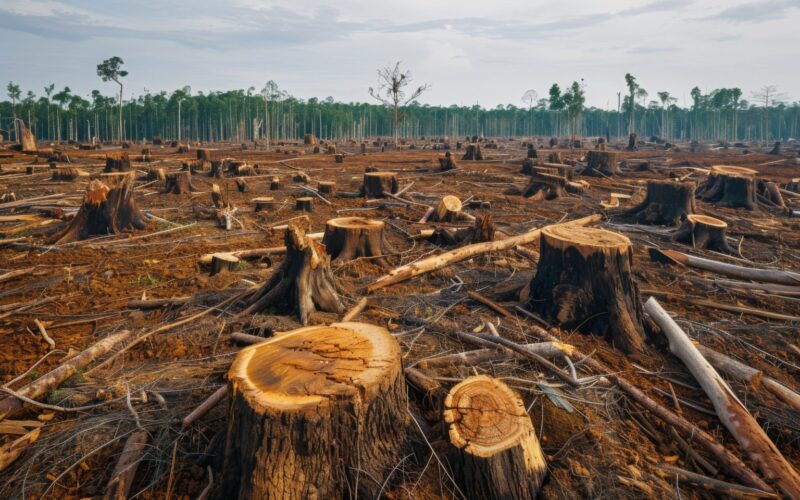Funds advertised as environmentally friendly are reportedly being used by major asset managers to funnel millions of dollars to JBS, the world’s largest meatpacker, accused of connections to deforestation and human rights abuses in its supply chain.
Research conducted by Global Witness reveals that prominent US asset managers, including BlackRock and Vanguard, are among six firms holding over $11 million in active bonds issued by JBS and its subsidiaries through funds branded with “environmental, social, and governance” (ESG) in their names.
While the documentation for most of these funds explicitly excludes investments in fossil fuels and controversial weapons, none specifically exclude companies associated with deforestation from their screening processes.
Furthermore, the 2024 annual report from Forest 500 indicates that more than half of the financial institutions with substantial exposure to deforestation—including BlackRock, Vanguard, and State Street—have yet to publish any policies addressing deforestation. This lack of policy suggests minimal engagement from the financial sector with companies involved in forest-risk activities.
“Simply incorporating the ‘ESG brand’ in fund names is often far too vague, failing to exclude climate-destructive companies like JBS. One of the clear issues with relying on self-reporting, self-managed ESG funds is the lack of standardisation on what exactly ESG means,” said Global Witness’s US Senior Policy Advisor, Ashley Thomson.
Global Witness analysed the Eikon Refinitiv data obtained in June 2024 which showed that 15 ESG-labelled funds held $11.6m in 16 JBS bonds.
“The fact that a company like JBS is included in an ESG-focused fund should speak volumes about the limitations of regulations governing these funds, and the dangers of allowing companies to grade their own homework,” Thomson added.
JBS is widely recognised as a pariah in the ESG (environmental, social, and governance) sphere. From 2021 to May of this year, 22 investors, including major banks and pension funds, have divested from JBS or its subsidiaries due to concerns about biodiversity loss and governance issues, according to the Financial Exclusion Tracker project.
A report by Global Witness earlier this year highlighted that JBS, along with other meatpackers Marfrig and Minerva, is linked to over 80,000 football fields of deforestation in Brazil. This is in addition to significant environmental and social concerns, as JBS has previously been implicated in governance scandals. Notably, the company’s executives were involved in a major corruption scandal in Brazil in 2017 and subsequently pleaded guilty to US foreign bribery charges in 2020 as part of a plea deal.
In response to these concerns, JBS stated that it maintains “an open and transparent relationship with its investors and bondholders” and emphasises its “zero-tolerance policy for illegal deforestation in all Brazilian biomes, or any other illegal activity” related to its supply chains.
However, these assurances are overshadowed by ongoing scrutiny, including a lawsuit from the state of New York against JBS’s US branch. The state’s Attorney General, Letitia James, has accused the company of “misleading” clients regarding its climate pledges, asserting that JBS lacks a viable plan to meet its public commitment to achieve net zero emissions by 2040.
Asset managers, including BlackRock’s CEO Larry Fink, have frequently argued that engaging with companies to influence their practices is more effective than divestment, which simply transfers ownership to potentially less responsible investors.
Though, some investors, such as Cardano Group—based in the UK and Netherlands and exclusively offering Article 8 or 9 funds—decided to divest from JBS in 2020 after failed engagement attempts.
Cardano Group began its engagement with JBS through a “collaborative initiative on deforestation,” according to Greta Fearman, the firm’s head of stewardship and sustainable investment. Over time, the firm identified additional ESG risks, including “corruption-related” controversies and “worker issues,” which they felt JBS failed to address adequately.
Fearman stated: “We understand deforestation is complex, and it doesn’t get solved overnight … But what [JBS] provided in terms of their oversight and expectations of suppliers was not robust enough.”
The findings that numerous ESG funds are still investing in JBS underscores the urgent need for new regulations in major financial centers like the EU, UK, and US. According to Ashley Thomson of Global Witness, institutional investors must screen out companies contributing to biodiversity loss through deforestation from their portfolios and ESG funds.





















